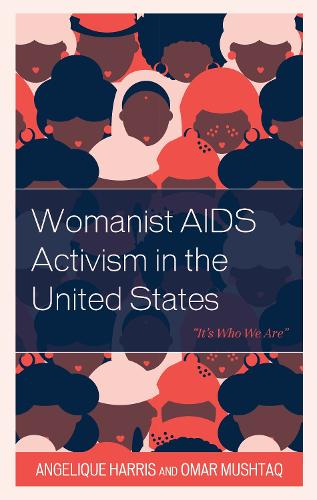
Womanist AIDS Activism in the United States: Its Who We Are
(Hardback)
Publishing Details
Womanist AIDS Activism in the United States: Its Who We Are
By (Author) Angelique Harris
By (author) Omar Mushtaq
Bloomsbury Publishing PLC
Lexington Books
4th January 2022
United States
Classifications
Professional and Scholarly
Non Fiction
Social and cultural history
Ethnic groups and multicultural studies
Feminism and feminist theory
Medicine:HIV/AIDS, retroviral diseases
362.19697920082
Physical Properties
Hardback
152
Width 162mm, Height 227mm, Spine 18mm
404g
Description
Womanist AIDS Activism in the United States: "It's Who We Are" is an in-depth exploration of AIDS advocacy work among Black women. HIV/AIDS has had a disproportionate impact on Black women. In addition to high infection and mortality rates, they are likely to be responsible for the caretaking of family, friends, and community members with HIV. Angelique Harris and Omar Mushtaq conducted interviews with 36 activists from across the nation to examine the ways in which race, gender, and identity influence the motivations and approaches behind their work. The authors use womanism an epistemological framework that centers the world views of women of color to better situate this activism within a larger sociocultural and historical context. They also argue that womanism better encapsulates the experiences of Black women than feminism or Black feminism. The authors provide an in-depth analysis of womanism and propose how it can be applied more broadly in examinations of community engagement among women of color, specifically Black women.
Reviews
Harris and Mushtaq are interested in one question: what drives Black women to get involved in AIDS activism To explore this, they have used womanist theory as a grounding framework. Unlike feminism--which may overlook Black women's experiences with race; intersectionality--which could be limiting in being chiefly useful for analysis; and Black feminism--which may focus on Black womanhood only, womanist theory allows the authors to explore the critical implications of subjects' experience for social activism, especially as shown by Black women who are involved in AIDS work. This book seeks to explain Black women's activism in a multidimensional context. The authors find that Black women's self-described experiences go against the grain of what larger bodies of work have claimed about Black-led social movements... Here, the authors focus on spirituality rather than organized religion as a factor that helps drive activism. Community and agency, rather than particular monolithic leaders, have provided the motive voice spurring these women's action. This book is a gem for those seeking links between activism, public health, and social justice theory. Highly recommended. Lower- and upper-division undergraduates. Graduate students, faculty, and professionals.
-- "Choice Reviews"The unapologetic application of womanism to improve the health of Black communities is culturally congruent with the spiritual, ancestral, emotional, and physical essence of Black peoples. This book expertly applies womanism to AIDS activism, advocacy, and sociopolitical involvement, particularly emphasizing the role of Black women as activists in the U.S. In doing so, the authors move beyond the personal as political towards the personal as survival, for all people. Indeed, 'Those most structurally marginalized within Black communities - for example, gay and bisexual men, intravenous (IV) drug users, and women (both trans and cisgender) - are disproportionately affected by AIDS.' The authors use the stories of women activists to demonstrate the epistemological and applied underpinnings of womanism. Womanism is the way to heal our communities and this book reframes community-based approaches and action in a way that truly heals.
--Jameta Barlow, The George Washington UniversityAuthor Bio
Angelique C. Harris is associate professor of medicine at Boston University and director of faculty development and diversity at Boston University Medical Campus.
Omar Mushtaq is lecturer at Chapman University.
